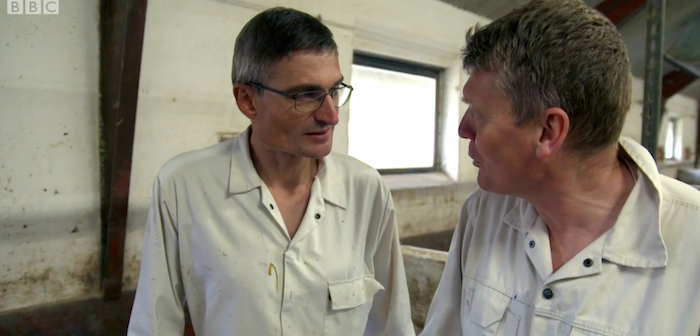The National Pig Association has highlighted the UK pig industry’s determination to maintain the current ‘very low’ levels of risk from Livestock Associated-MRSA (LA-MRSA) in pigs in this country, writes ALISTAIR DRIVER.
The association has responded to a feature on the BBC Countryfile programme about the problem of LA-MRSA in Denmark, where about 88% of pig farms are believed to be infected with the antibiotic-resistant bacteria, also known as MRSA CC398.
The feature, which can be viewed here (7 and 27 mins), described the situation in Denmark as a ‘public health scandal’.
Presenter Tom Heap acknowledged that for most people the bug poses ‘very little risk’, with people working pigs ‘at the highest risk’. He also stressed that although the bug is found on meat, it is killed by proper cooking.
A microbiologist working in Denmark told Mr Heap that, while in most cases of infection ‘nothing really happens’, a minority of patients may get life-threatening infections. There is ‘clear evidence’ seven patients have died of MRSA CC398, he said.
The feature linked the spread of the bug to overuse of antibiotics in Denmark and highlighted calls to significantly reduce usage.
It turned the spotlight on the UK, where LA-MRSA has only been confirmed in a small number of pigs. But with nearly 700 live pigs imported from Denmark last year and no compulsory testing in either Denmark or the UK, Mr Heap said addressing the problem was ‘in our interests, too’.
NPA chief executive Zoe Davies was interviewed for the feature but the footage was not shown on the programme. Part of an NPA statement sent to the programme was featured, noting that ‘producers were aware of the public concern’ and highlighting the association’s recommendation that all imported pigs are tested for LA-MRSA.
The NPA was quoted as saying CC398 is considered to be of low risk to health and not a food safety issue.
NPA response
Commenting after the programme was aired, Dr Davies added: “The programme did briefly feature our comments but it is really important to put this in its full context.
“LA-MRSA has not been deemed high risk by the government, and is not the same as hospital associated MRSA, so the public should not be worried. Hospital surveillance has picked up very few cases and none that are associated with people working directly with livestock.
“In addition, the recent Food Standards Agency MRSA risk assessment confirmed, there has never been a single case documented of LA-MRSA being contracted by anyone eating meat products from anywhere in the world.
“I also want to stress that the link made between antibiotic usage on farms and the prevalance of bugs like LA-MRSA is not as simplistic as is made out in features like this. For example, Denmark has already significantly reduced antibiotic usage but LA-MSRA levels remain high.
“However, we know LA-MRSA is here in the UK and, as a proactive industry we have worked with government to provide guidance for those working with pigs to reduce risk even further.
“The NPA has developed an imports protocol in conjunction with the UK breeding companies, which is now mandatory under Red Tractor.
“It details testing that should be considered for many key diseases that we don’t wish to import, including LA-MRSA, when anyone is bringing in live breeding animals or semen from outside the UK.”


